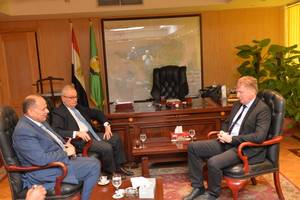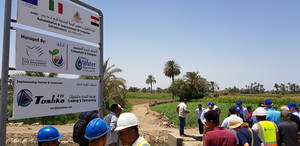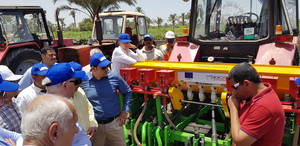EU delegation observes the benefits of raised-bed technologies

Fayoum - Egypt, July 18th – The European Union Joint Rural Development Programme (EU-JRDP) aims to strengthen the capacities of rural associations (farmers and non-farmers) and support the socio-economic development of rural beneficiaries in Fayoum, Minya and Matrouh governorates.
The EU-JRDP Programme supported the adoption of climate change mitigation and adaptation practices through proper water usage activities and the adoption of Good Agricultural Practices (GAPs). The Ambassador of the European Union in Egypt, Ivan Surkos, and Italy's Ambassador to Egypt, Giampaolo Cantini, met Fayoum governor, Isam Saad, and visited several projects funded by the EU-JRDP. They were particularly interested in how environmental issues are addressed through agricultural waste management and its reuse for composting. In addition, they learned how the adoption of GAPs reduced the use of chemical inputs.
They also observed how specific activities were implemented to support gender equality and to improve living conditions and opportunities for women. These included access to micro-credit, and training support to develop agricultural and non-agricultural income generating activities.
Farmers witnessed (see video) how the adoption of GAPs led to a boost in the quality and quantity of main crops available, and how it enhanced and strengthened rural community associations.
Service and works contracts improved water management, increased water harvesting and arable land, promoted agricultural waste reused and established local Action groups (LAGs) in Fayoum Governorates. The supply of machinery and equipment has strengthened the local association of farmers and artisans, as well as national institutions.
Dr. Atef Swelam of ICARDA introduced the raised bed technology to visitors. This improved surface irrigation
technique is offering farmers a practical and more sustainable alternative to conventional irrigation systems, which tend to be highly inefficient and waste already-scarce water resources. With this technology, crops are planted on ridges and irrigation water is applied to the bottom of furrows. Instead of spreading water over the entire surface area – the practice most commonly applied by farmers – raised-bed planting collects water more efficiently, applying this precious resource where it is most needed. Its introduction in Fayoum is not only improving water use efficiency – the amount of crop generated per m3 of water – but raising yields and boosting farmer incomes.
Further references:
Power point presentation by Atef Swelam: Improve on-farm irrigation management
Further contact:
Atef Swelam, Senior Scientist-Irrigation Water Management, ICARDA [email protected]



